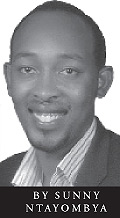Its human nature to find ways to simplify things and then bracket them; I see it all the time. You make assumptions because you don’t either have the time to do the research, or are too lazy to do so. I’m sure that any number of us have been misunderstood and/or misjudged.


Its human nature to find ways to simplify things and then bracket them; I see it all the time. You make assumptions because you don’t either have the time to do the research, or are too lazy to do so. I’m sure that any number of us have been misunderstood and/or misjudged.
As an individual that has felt the sting of that human behaviour, I want to constantly say, "You don’t get it”.
I feel that Rwanda, and what Rwanda is all about, is misunderstood by the very people I’d hope would have the sense to know better. As anyone will attest, Kigali has become the regional magnet for all sorts of foreign aid workers, interns, volunteers and students. I have become friends with a few of them and I’ve enjoyed the conversation we’ve had.
However, the one thing that I’ve attempted to do, and failed on countless occasions, is to explain the Rwandan political system. And I can never understand why. It seems very open and shut to me.
Here is an example of a conversation I’ve had; "Rwandans chose their own Constitution, vote for their leaders, their elected representatives make the laws, and there is a separation of powers that is guaranteed in the Constitution…so why do you say that Rwanda is authoritarian in nature?”
While acknowledging these facts, these friends of mine stick to their guns but they switch the debate. They say that they "approve the authoritarian slant of the government and understand why it is necessary”.
Somehow, the democratic practices of the Rwandan government are ignored without reason while the label of authoritarianism is hoisted up it. When this is done by visitors in this country, I find it forgivable because they might simply not have enough information. However, when it is done by people who call themselves ‘experts’ then it becomes unforgivable.
When an internationally renowned journalist like Gwynne Dyer pens an article titled "Rwanda President Paul Kagame tiptoes around democracy” and then syndicates it to hundreds of publications worldwide, I become flabbergasted.
When he begins by writing "Did Paul Kagame really stop the genocide in Rwanda 16 years ago, or did he just interrupt it for a while?”
I have to wonder whether he knows what he’s talking about. He continues by saying that "Kagame is running for reelection to the presidency of the traumatised central African country next month.
If economic success automatically brought political success, he would be a shoo-in: Rwanda’s economy grew by 11 percent last year. But in fact, his resounding election victory in 2003 was the result of ruthless manipulation, and this one will be the same”.
So, in a shamelessly arrogant manner, the writer makes the point that in any ‘normal’ country the benefits that this government has given to its people would be awarded by the citizenry in the polls. However, he reasons, Rwandans aren’t ‘normal’ and for us to act in a rational manner is so beyond us that, when we do, it means something fishy is going on.
While parts of the article have hints of truth, others are so patently untrue that I feel his readers must demand an apology. Mr. Dyer writes that "The army is exclusively Tutsi and the government almost entirely so”.
While I can understand the ideological debate people have, because of the manner in which the Rwandan political system works, when this debate ignores even the most basic facts, facts which can be found with a quick trip to Google, one has to ask if the piece of journalism is written in good faith.
To somehow say that some of the few challenges this country is dealing with are because of clan rivalries is actually laughable. He ignored the facts that were available to him, and ended up with an opinion that is both confused and unfortunate. This "Rwanda is authoritarian” slant that coloured his views is based on falsehoods.
An authoritarian government is one in which political power is concentrated in a leader or leaders, typically unelected, who possess exclusive, unaccountable, and arbitrary power. Does that sound like Rwanda?
The President of Rwanda was elected by the people overwhelmingly, and election observers from all over the world attested to the fairness of the polls.
The decentralisation drive that is being spearheaded by the Ministry of Local Government has put power into the hands of local government councils, which are elected by the people and not foisted upon them by Kigali.
Is the President unaccountable to anyone? Well, I guess if that was true he wouldn’t have to declare his wealth to the Office of the Ombudsman. But he does. Is his power arbitrary, or in other words, without a legal basis or control? If one carried out a study of the Constitution and all the laws that pertain to the presidency, they would find that President Kagame has stayed within the bounds of the laws of the land.
So, why aren’t we called a democracy? Because we prosecute politicians and journalists who spread hate? Is anything more democratic than protecting the lives of our citizens? And following the laws their elected representatives enacted to boot?
sunnyntayombya@newtimes.co.rw


